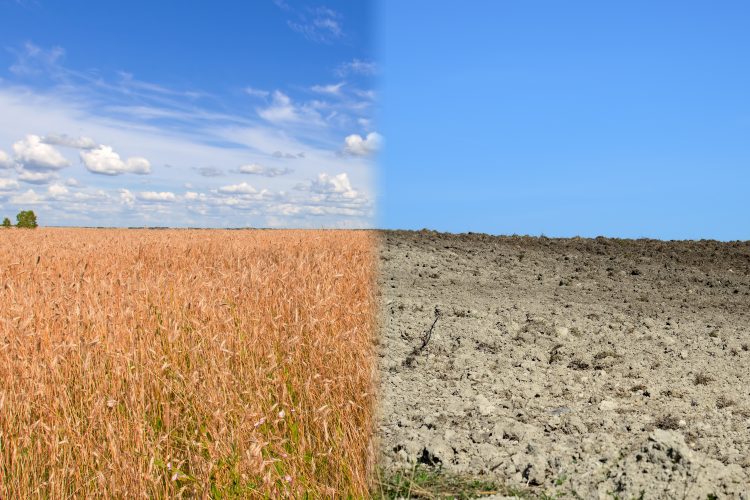UK crop yield resilience tested by climate change
- Like
- Digg
- Del
- Tumblr
- VKontakte
- Buffer
- Love This
- Odnoklassniki
- Meneame
- Blogger
- Amazon
- Yahoo Mail
- Gmail
- AOL
- Newsvine
- HackerNews
- Evernote
- MySpace
- Mail.ru
- Viadeo
- Line
- Comments
- Yummly
- SMS
- Viber
- Telegram
- Subscribe
- Skype
- Facebook Messenger
- Kakao
- LiveJournal
- Yammer
- Edgar
- Fintel
- Mix
- Instapaper
- Copy Link
Posted: 20 October 2022 | Grace Galler | No comments yet
“Climate change will push the boundaries of what can be achieved though crop management,” warn researchers, as wheat yields see poorest levels in decades.


Although wheat yields have generally been resilient against continuous blows of extreme weather conditions, the future of our most widely grown food crop is uncertain.
In the past 30 years, UK crop yields have endured various and severe conditions, including the storms Denis, Eunice and Franklin, and the unprecedented heatwave of 2022. As a result, yields have been subject to inconsistent rainfall, dryer soil conditions, and increased evaporative demand.
A study, carried out by a research team including the University of Oxford, the UK Centre for Ecology & Hydrology (UKCEH), the Met Office, and Bristol University (published in the journal Earth System Dynamics), has examined wheat yields and simultaneous meteorological conditions across the main agricultural areas of Britain since 1990. The team also investigated the potential effect of projected climate change on production in the coming decades.
Although the research shone a light on the robust nature of UK yields due to effective crop management from farmers, coupled with wheat’s ability to tolerate a range of climatic conditions, they also observed that certain combinations of extreme weather during the growing season has really taken its toll.
Throughout the course of 2020, torrential autumn rain hampered sowing of crops, while an exceptionally dry spring affected plant growth and heavy downpours in August created very challenging harvesting conditions. This resulted in some of the UK’s poorest wheat yields for decades, at just seven tonnes per hectare, a 22 percent decrease from 2019.
Commenting on the findings of the study, co-author of the report, Professor Richard Pywell of UKCEH, said: “Until now, farmers have largely been able to compensate for adverse weather conditions by changing when they sow or harvest crops, or by altering the timing and amount of fungicide, pesticide, or fertiliser that they apply to fields.
“However, climate change will push the boundaries of what can be achieved though crop management, and it could become increasingly difficult for farmers to deal with the impacts of more frequent extreme weather events. This could affect the quality and quantity of crops, and therefore food production, in the UK.”
The researchers used high resolution climate projections up to the year 2080 to observe how possible future changes in temperature and rainfall under a high-emissions scenario could affect the key crop growth stages in major wheat-producing regions, specifically in Eastern and Southern Britain.
It found that future warmer winter temperatures could offset the negative impacts of increasing rainfall between October and April, while warmer temperatures and drier conditions in June and July would greatly benefit yields.
Dr Louise Slater of the University of Oxford’s School of Geography and the Environment, who led the study, explained: “Our research shows that, on average, warmer temperatures are likely to have generally positive impacts on yields in key UK wheat-growing regions. However, there may be multiple extreme weather events, such as intense thunderstorms or prolonged drought, occurring over the course of a year and therefore greater uncertainty over future wheat yields.”
While UKCEH climate scientist Dr Chris Huntingford, a co-author of the research, heeded this warning: “Over the past decade, we have already seen an increase in both extreme dry and wet spells, depending on the season, and this pattern is expected to continue further. Even with large reductions in greenhouse gas emissions, climate change will still generate weather conditions outside those in which our intensive agricultural systems have developed.”
Related topics
Environment, Food Security, Quality analysis & quality control (QA/QC), Research & development, Supply chain, Sustainability, Technology & Innovation, Trade & Economy
Related organisations
Bristol University, Earth System Dynamics, UK Centre for Ecology & Hydrology (UKCEH), UK Met Office, University of Oxford









